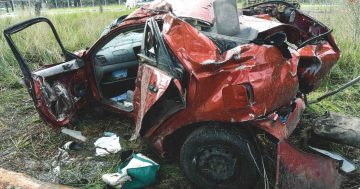
Nicholas Alexander Gordon, 25, leaves court after being handed a community-based sentence. Photo: Albert McKnight.
CONTENT WARNING: This story contains graphic descriptions which may distress some readers.
A road-raging driver caused a cyclist to smash into his rear windscreen, then drove off, leaving the cyclist battered and bloody with horrific injuries that included a destroyed nose.
Nicholas Alexander Gordon later returned to the scene after leaving, even though his victim had asked him to call an ambulance. He went on to tell police he “brake checked” in front of the cyclist to “teach him a lesson” because the man had flipped him the bird.
On Thursday (2 June), ACT Supreme Court Justice Michael Elkaim said it was a “classic case of road rage”, which was when normally law-abiding drivers committed an act of “absolute stupidity”, but also said despite the cyclist’s “horrendous” injuries it would not be in the interests of justice for 25-year-old Gordon to go to jail.
He said the cyclist had been driving along Hindmarsh Drive in south Canberra on 23 October 2020, using a route that he took every week with lights on his bike and helmet.
Gordon, approaching him from behind in his Holden Astra, claimed the cyclist was weaving in and out of the lane, so beeped him with his horn as he went past. The cyclist responded by putting up his middle finger at him.
They both turned onto Athllon Drive and Gordon deliberately put on his brakes while in front of him, forcing the cyclist to smash face-first into his rear windscreen, which shattered, and he ended up on the car’s roof.
The bike was destroyed and court documents say “body matter” from the victim was left on and inside the Astra.
The cyclist asked Gordon to call an ambulance, but he drove off and the cyclist was helped by a passing motorist. Gordon reconsidered his decision and returned later.
The injuries to the cyclist included a degloving to his nose requiring skin grafts, facial fractures, fractured teeth, numerous lacerations and a cartilage tear to his shoulder.
He needed emergency surgery and continuing care, including from a plastic surgeon, was diagnosed with post-traumatic stress disorder, and a doctor said he would have permanent scarring and disfigurement to his face and neck.
Justice Elkaim said there was no doubt Gordon, who worked as a parts advisor for a car company, had shown a significant amount of remorse and a report found he “presented as a sensitive person”.
He said he was satisfied Gordon didn’t intend to cause harm, but his actions were a product of gross negligence.
Justice Elkaim sentenced him to three years’ jail to be served via an intensive corrections order, a community-based sentence, and disqualified him from driving for 12 months.
Gordon had pleaded guilty to a charge of culpable driving causing grievous bodily harm.




















Saw one these in the flesh and thought it was the ugliest thing since the suzuki Ignis. What were… View